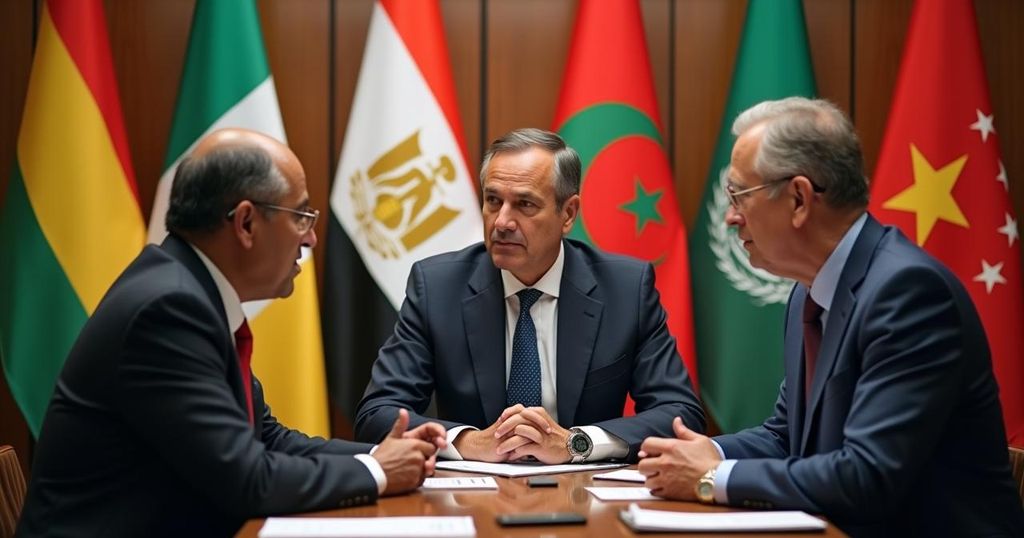Strengthening Alliances: Egypt, Somalia, and Eritrea Unite Against Ethiopia

Leaders from Egypt, Somalia, and Eritrea have met in Asmara to strengthen their alignment against Ethiopia, amidst rising tensions regarding territorial disputes and resource management. Concerns arise that this collaboration could escalate into conflict, particularly given historical grievances and Ethiopia’s ambitions for port access.
In a significant development, the leaders of Egypt, Somalia, and Eritrea convened in Asmara, the capital of Eritrea, to strengthen their alliances against Ethiopia. A concluding statement from the summit underscored respect for regional sovereignty and territorial integrity, which may implicitly address Ethiopia’s aspirations for port access. Somalia’s recent diplomatic tensions have propelled its alignment with Egypt and Eritrea, both of which have longstanding grievances against Ethiopia. The growing friction among these nations raises concerns about potential conflict. Hassan Khannenje, the director of the Horn International Institute for Strategic Studies, remarked, “This is an axis against [Ethiopian capital] Addis Ababa. I think it’s an attempt to bring the hate together in trying to increase pressure against Addis Ababa.” A photograph from the meeting depicted President Isaias Afwerki of Eritrea, alongside Egypt’s President Abdul Fattah al-Sisi and Somalia’s President Hassan Sheikh Mohamud, shaking hands. The leaders jointly asserted their commitment to bolster Somali governmental institutions to tackle various internal and external challenges and to empower the Somali National Federal Army in its fight against terrorism. This was President Sisi’s inaugural visit to Asmara, while President Mohamud has made multiple visits this year. Previously, Ethiopia has been a crucial ally of Somalia in combating the al-Qaeda-affiliated group al-Shabab. However, tensions escalated when Ethiopia entered a preliminary agreement with Somaliland over leasing part of its coastline—a move Somalia contests as infringing upon its territorial sovereignty. In addition, relations between Addis Ababa and Cairo have been fraught for over a decade due to Ethiopia’s construction of a large hydroelectric dam on the Nile, viewed by Egypt as a threat to its vital water supply. Recently, Egypt facilitated the delivery of military supplies to Somalia, including a shipment that arrived last month, which followed military aircraft delivering arms in August. While a peace agreement signed in 2018 between Ethiopia and Eritrea initially fostered hope for improved relations, the situation has since deteriorated, especially after Ethiopia’s civil conflict in the Tigray region. Eritrea supported Ethiopia during the Tigray war but has shown reluctance towards the peace accord that was reached in November 2022. Furthermore, Ethiopia’s pursuit of access to a Red Sea port, articulated by Prime Minister Abiy Ahmed last year, has further strained relations with Eritrea. In summary, the recent summit among Egypt, Somalia, and Eritrea reflects a strategic alignment aimed at countering Ethiopian influence in the region—a complex scenario driven by historical grievances and ongoing geopolitical tensions.
The geopolitical landscape of the Horn of Africa is characterized by long-standing rivalries and alliances, with Ethiopia, Egypt, Eritrea, and Somalia entangled in a web of historical grievances. Ethiopia has been landlocked since Eritrea gained independence, leading to aspirations for port access. The relations between Ethiopia and Egypt have been particularly tense due to Ethiopia’s construction of a dam on the Nile River, vital for Egypt’s water supply. Meanwhile, Somalia’s internal conflicts and disputes over territorial claims, especially regarding Somaliland, have impacted its foreign engagements. The recent summit among Egypt, Somalia, and Eritrea denotes a significant shift, aligning these nations against Ethiopia amidst rising tensions.
The recent summit in Asmara marks a pivotal moment in the evolving dynamics of the Horn of Africa, as Egypt, Somalia, and Eritrea solidify an alliance against Ethiopia in light of historical grievances and geopolitical challenges. With the potential for escalated conflict looming, the international community must closely monitor these developments and their implications for regional stability and cooperation.
Original Source: www.bbc.com








